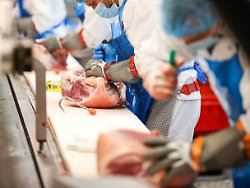Wednesday December 16, 2020
"We clean up thoroughly"
Bundestag takes action in the meat industry
The working conditions in the meat industry have been discussed time and again as inadequate recently, not least due to corona outbreaks. Now the Bundestag has approved stricter rules in the industry. Including a ban on work contracts and mostly also temporary work.
In the meat industry, stricter rules will apply in the future, which are intended to put a stop to the exploitation of workers. The Bundestag has now approved a draft of the federal government for an occupational health and safety control law, which, among other things, is supposed to guarantee improvements in accommodation and provides for a ban on work contracts. The food-pleasure-restaurants union (NGG) welcomed the law by Labor Minister Hubertus Heil from the SPD as a "historic milestone" for the meat industry.
473 MPs voted in favor of the bill, 152 rejected it, with five abstentions. The decision prohibits work contracts and largely also temporary work in the meat industry. Because with it an "organized irresponsibility" spread in the branch, said Heil in the Bundestag. This will now be ended.
"From January 1st, work contracts in the meat industry will be banned," emphasized the minister. "As of April 1st, temporary work in the field of slaughtering and cutting will also be available," he added. "And also in the meat processing sector, temporary work is basically prohibited – only a collective agreement makes that possible."
"Clean up thoroughly in the meat industry"
This means that the unions have "their foot in the door," said Heil. "We are cleaning up the meat industry thoroughly because it is about the human dignity of employees." It is also about "the value and dignity of work".
The NGG chairman Guido Zeitler welcomed the Bundestag resolution: "Now there is a chance to reorganize the industry," he said. The union has fought for many years to end the abuse of work contracts with an "uncontrollable system of subcontractors and the associated merciless exploitation of people, especially from Southeast Europe, who also had to live inhumanely."
However, the law is only the first step towards regulated conditions and a better image of the industry. It is also necessary that employers conclude collective agreements with the union.
After months of tug-of-war, the government coalition made up of the Union and SPD agreed on the law at the end of November. The trigger for the law was the many corona infections in numerous large meat processing companies. The reasons for this included the working conditions and the accommodation of the mostly foreign employees in often cramped conditions. The meat industry protested sharply against the stricter regulations in advance.
. (tagsToTranslate) Politics (t) Meat Industry (t) German Bundestag (t) Meat (t) Hubertus Heil
